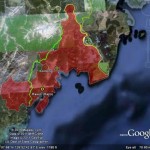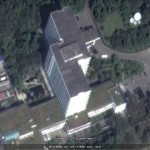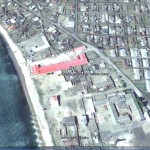UPDATE 9 (2011-9-6): South Korea is slated to deliver flood relief assistance next week. According to Yonhap:
South Korea’s Red Cross said Tuesday it will send baby food to North Korea across their heavily fortified border next week as its first batch of its emergency aid to North Korea’s flood victims.
The move came a month after Seoul offered to send 5 billion won (US$4.7 million) worth of emergency relief aid, including baby food, biscuits and instant noodles, to North Korea.
South Korea’s Red Cross said in a message to its North Korean counterpart on Tuesday that it will truck 200,000 packs of baby food in the eastern and western sections of the border next Thursday.
The Red Cross said it will send other relief items by the middle of October and it proposed holding consultations with North Korea to ensure Seoul’s aid to North Korea reaches the intended beneficiaries.
…
Last year, Seoul sent 5,000 tons of rice, 3 million packs of instant noodles and 3,000 tons of cement to North Korea to help it recover from devastating floods.
UPDATE 8 (2011-9-4): The US Government has send flood relief supplies to the DPRK. According to CBS News:
State Department spokeswoman Victoria Nuland says the plane is carrying blankets, soap and hygiene kits. It will arrive in Pyongyang this weekend.
The U.S. has said it will provide North Korea $900,000 in emergency aid through U.S. charities.
On September 4th, KCNA posted video of the plane arriving. See it here (if you are allowed).
Samaritan’s Purse also posted two videos of their departure to and arrival in Pyongyang.
According to the Associated Press:
Samaritan’s Purse said it has pledged $1.2 million in addition to the $900,000 that the U.S. government has allocated for aid to North Korea through U.S.-based charities.
Ken Isaacs, a Samaritan’s Purse vice president, said the group has worked with the U.S. government and several other Christian organizations to send the aid as they try to “continue gaining humanitarian access into North Korea.”
Here is a list of US-DPRK engagement in 2011.
At least one report from Rason seems to indicate that the DPRK’s impending food shortage is not so severe of a problem.
UPDATE 7 (2011-8-23): United Grain Sends First Wheat Shipment to North Korea as Aid. According to the San Francisco Gate:
United Grain Co., Russia’s state grain trader, sent its first shipment of 3,560 metric tons of milling wheat to North Korea as humanitarian aid, the company said in an e-mailed statement today.
The ship arrived at the North Korean port of Hynnam, from Russia’s Vladivostok port on Aug. 20, the company said. It was the first of several shipments.
United Grain will send 50,000 tons of wheat from ports in Vladivostok and Novorossiysk to North Korea, the statement said.
UPDATE 6 (2011-8-22): According to this article in The Telegraph, the North Korean Red Cross has launched a £2.7m emergency appeal to help the victims of a series of floods and storms. More information can be found here and here.
UPDATE 5 (2011-8-19): The IFRC has posted a map of the counties in which they are involved in flood relief. See it here. The IFRC has also posted an emergency appeal for assistance. You can see it here.
UPDATE 4 (2011-8-18): US to provide $900,000 in emergency relief supplies to North Korea after devastating floods. Read more at the AP (Via Washington Post) and Reuters. Here is a collection of stories related to the DPRK’s alleged food shortage this year. Here is a list of DPRK-US engagement events this year.
UPDATE 3 (2011-8-10): ROK lists food items it will donate to the DPRK in the wake of flooding. According to the Daily NK:
The South Korean government today transmitted to the North a list of the aid items it will deliver in response to recent flooding.
A spokesperson for the Ministry of Unification reported the news this afternoon, saying, “We transmitted a communication containing a concrete list of aid items to the North this afternoon in the name of the president of the Korea National Red Cross.”
The aid includes; 1.4 million units of high protein food, 300,000 units of snacks, 1.92 million Choco Pies and 1.6 million units of instant noodles, but, as previously reported, does not include rice, wheat flour or building materials.
The aid is expected to be conveyed overland along the west and east coasts to areas of Hwanghae and Gangwon Provinces.
“We excluded North Korea’s requested food and cement, but with the exception of medicines the emergency aid was modified mostly as per the North’s request,” the spokesperson explained.
UPDATE 2 (2011-8-10): ROK offers to send relief items to flood-hit DPRK. According to Yonhap:
South Korea sent North Korea a list of relief items it is willing to deliver to flood victims in the impoverished nation, an official said Wednesday.
The South’s Red Cross delivered the message to the North earlier Wednesday, offering 5 billion won (US$4.6 million) worth of emergency staples including nutritional foods for infants, biscuits and instant noodles, according to the official from the Unification Ministry.
UPDATE 1 (2011-8-9): EU provides resources for flood victims. According to the Korea Herald:
The EU, which shipped food aid to the impoverished state to feed its starving people last month, has donated 200,000 euros ($280,000) to the International Federation of Red Cross in flood aid, Voice of America reported, quoting an EU official.
ORIGINAL POST (2011-8-9): Relief Web has put together a compendium of stories and reports (DPRK, ROK, IFRC, and UN) related to recent flood damage in the DPRK (July and August). Below are links and descriptions:
Briefing kit 1: Situation reports (PDF) on the flooding:
1. DPRK affected by serious floods following torrential rains in July
2. GIEWS Country Brief: Democratic People’s Republic of Korea 08-August-2011
3. Democratic People’s Republic of Korea: Floods DREF operation n° MDRKP003
4. Heavy Rain Damage: Situation Report #2
5. Floods: Situation Report #1
Briefing kit 2: This report (PDF) is an update of the August 7 collection and features media clippings and situation reports:
1. Democratic People’s Republic of Korea – Flood Update
2. Russia to Send 50,000 Tons of Food Aid to N.Korea
3. DPRK affected by serious floods following torrential rains in July
4. GIEWS Country Brief: Democratic People’s Republic of Korea 08-August-2011
5. Flood Damage Gets Serious
6. Seoul Greenlights Food Aid for N.Korea, But Not Rice, Cement
7. Nationwide Relief Effort Launched for S. Hwanghae Province
8. Downpour Batters DPRK Again
9. Damage from Heavy Rains
10. Red Cross Relief Activities Launched in DPRK
11. S. Korea offers N. Korea flood aid
12. Floods (as of 29 Jul 2011)
13. Democratic People’s Republic of Korea: Floods DREF operation n° MDRKP003
14. N. Korea PM inspects flooded region: state media
15. N. Korea storm, rains ‘kill dozens’: state media16. N. Korea state media says China to send flood aid
17. Rain leaves trail of destruction in North Korea
18. Floods wash N. Korean landmines into S. Korea
19. DPRK Hit by Heavy Rain Again
20. S.Koreans on landmine alert after deadly mudslides
21. Floods – July 2011
22. Heavy Rain Damage: Situation Report #2
23. Floods: Situation Report #1
24. Coal Mines Damaged by Heavy Rain
25. Floods Hammer Homes And Fields
26. Heavy Rains Hit DPRK
27. DPRK Hit by Heavy Rainfalls Again
28. Some Areas of DPRK Hit by Heavy Rain



